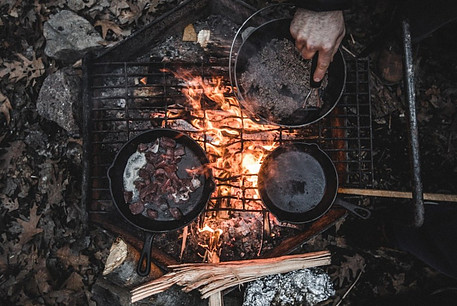
Begin by preparing yourself to be a survivor. That means preparation in every sense. This section is focused on making sure that you have the right equipment for any expedition you undertake. It introduces the idea of carrying a pocket-size kit of carefully selected key survival aids – which should go with you everywhere.
A knife is your MOST important survival tool. It must be chosen and used carefully and it must be kept in perfect condition. I personally own this US Marine Corps Fighting Knife and keep it nearby at all times.
Equally important is a personal preparedness, so that you are both physically and psychologically equipped to deal with the stresses and hazards of survival conditions. You must have a clear understanding of survival needs, whether it be medical training, or the ability to provide for basic needs, especially the need for – and knowing ways of obtaining and storing – water.
Essentials For Survival
The human species has established itself in almost every corner of the Earth. Even in territories too inhospitable to provide a regular home, mankind has found a way to exploit resources, whether by hunting or taking wealth from the ground, and has often pitted its skills against nature simply for the satisfaction of doing so.
Almost everywhere, nature provides the necessities for survival. In some places the provision is abundant, in others very meager and it takes common sense, knowledge and ingenuity to take advantage of the available resources. Even more important is the will to survive. Men and women have shown that they can survive in the most adverse situations. However, this was only possible because of their determination to do so – because without that, any set of skills and knowledge will be useless if you find yourself between a rock and a hard place.
Survival is the art of staying alive. Any equipment you have must be considered a bonus. You must know how to take everything possible from nature and use it to the full, how to attract attention to yourself so that rescuers may find you and how to make your way across unknown territory back to civilization.
If hope of rescue is not in the cards, you must know how to navigate without map or compass. You must know how to maintain a healthy physical condition, or if sick or wounded, heal yourself and others. You must be able to maintain your morale and mental health and that of others who share your situation.
Lack of equipment should not mean that you are unequipped because you will carry skills and experience with you. However, those skills and experience must not be allowed to get rusty and you must continue to grow in your knowledge all the time.
We are all used to surviving on our home ground – though we may not think of our lives in that way – but the true survivor must learn how to survive when taken from familiar surroundings or when those surroundings are drastically changed by man or nature.
Anyone, young or old, from whatever walk of life, can find him or herself in a survival situation. As more and more people fly the globe, sail small boats or cross the sea in large ones, walk the hills and climb mountains and take their holidays in ever more exotic places, the situations to which they could become exposed are increasingly diversified.
But survival skills are not only concerned with the extremes of the air crash on a mountain peak, a shipwreck in the tropics or a vehicle breakdown in the middle of a desert. Every time you fasten a seat belt in your car, you are giving yourself a greater chance of survival. Checking each way before crossing the street or ensuring that an open fire is safe before you go to bed are survival techniques that you carry out instinctively. Turning survival skills into habits is just as important as acquiring new skills.
The main elements of survival are Food, Fire, Shelter, Water, Navigation and Medicine. To put these in order of priority we use the acronym P.L.A.N. No matter where you are in the world, this will never change, be it the Arctic, desert, jungle, sea or seashore.
P – For Protection
You must ensure that you are protected from further danger (e.g. impending avalanche, forest fire or exploding fuel). Always stay on the scene of the incident as long as it is safe to do so and then make sure you are protected from the elements. This means making a shelter and often lighting a fire. There are several reasons why you should always stay at the scene:
- You can utilize the wreckage for shelter, signaling, etc.
- It’s a bigger signature on the ground, making it easier to find.
- There are probably injured people that cannot be moved.
- By staying where you are you conserve energy.
- Because you stayed on route with little or no deviation, rescue time will be minimal.
L – For Location
The next step after building a shelter is to put out the emergency signals. You must draw attention to your position. Do this as soon as possible to help the rescuers.
A – For Acquisition
While waiting to be rescued, look for water and food to help supplement your emergency supplies. But, remember to remain close to an original crash site and search in pairs of two, if possible.
N – For Navigation
Good navigation will keep you on course and will often help you to avoid a survival situation. But if you find yourself stranded, always stay where you are.
Medical
You must become your own doctor and carefully monitor yourself at all times. Treat blisters as they occur, don’t let them become septic (blood-poisoning). Keep an eye on your companions and deal with any unusual problems as they arise. If they are limping, falling behind, or behaving strangely, stop and treat them immediately.